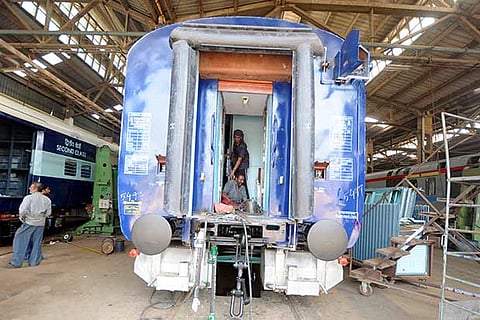

Chennai
Rail travellers in south India beware! If you felt safer in the South, while passengers of the ill-fated Indore-Patna Express derailed due to alleged rail fracture, think again. The accident where 140 people were killed last week brought the safety factor of Indian Railways into sharp focus.
Nearly 90% of the coaches used in Southern Railway (SR), which covers Tamil Nadu and Kerala, are unsafe, if one were to go by the railway ministry’s own admission that production of ICF coaches would be halted in 2019 and replaced with safer German designed LHB (Linke Hoffman Bosch) coaches, as was recommended by Anil Kakodkar committee report on rail safety way back in 2012. DTNext has learnt that nine out of ten coaches in southern railway fall under the ‘unsafe’ category. Of the total 6,082 coaches in SR, over 5,450 use the obsolete screw couplers, the same technology found to have been used in the S1 and S2 coaches, which suffered the most damage in the Indore-Patna express accident owing to coaches piling up one over another.
About 130 express and over 120 passenger trains are running on the old screw-coupler technology, which is more susceptible to pile up (coaches climbing over one another, resulting in high casualty). Only eight express trains, including recently upgraded Chennai Egmore-Madurai Pandian Express, run fully on LHB coaches, while another six express trains run on ICF coaches retrofitted with Center Buffer Couplers (CBC - Rs 4.5- 5 lakh per coach), which also prevent a pile- up, popularly called telescopic effect in railway circles.
SR sources in the know of things told this paper that the CBCs prevent coaches from dismantling and instead make them trip during derailment, unlike screw couplers that detach, forcing coaches to ram and climb one over the other at high velocity. “Since LHB and CBC equipped ICF coaches remain connected, there is a good chance of once coach holding the other like a chain and hence it also contains the damage during derailment, “an operations department source explained under condition of anonymity.
Notably, that was not the end of the SR’s coaching woes. Even among the old coaches, a third are over 15 years old, which also includes 614 coaches between 21 and 25 years. Add the average daily distance covered by coaches (official estimates put the average distance covered by a coach at 550 km per day), ten per cent of the coaches used in trains operated in SR zone have coaches that have already covered over 40 lakh kilometers.
Decline in coach allotment
There has been a gradual decline in the number of new coaches allotted to the zone by the railway board. From 433 new coaches in 2014 fiscal, the number of new coaches delivered to the zone has reduced to 107 (up to October) this financial year. However, a marginal decline in the condemnation ratio of coaches in the zone, which has seen only 117 coaches condemned thus far this financial year, as against the 158 in 2014, has been registered.
SR experts decry
ICF phase out While welcoming the proposal to introduce safer LHB coaches, senior SR experts, however, opined that it would be unwise to summarily treat ICF coaches ‘unsafe’ and write them off. The best thing to do would be retrofitting existing or producing new ICF coaches with better safety features like CBC. They also suggested that railways should reduce the maximum age of coaches from existing 25 years, which was fixed when the maximum speed clocked was only 60 kmph more than four decades back. “Today our express trains are running at 110 kmph easily. If you insist on using coaches that had covered 40 lakh kilometers in two decades, it would reflect on the comfort level and safety,” SR officers requesting anonymity said, adding that reducing the age of ICF coaches by at least five years and adding safety features would be wiser than phasing them out.
ICF receives order to halt production
Meanwhile, ICF (Integral coach factory) has received orders from Railway Board (RB) to gradually phase out conventional screw coupling coach production and increase LHB coach production. ICF has been manufacturing 300 LHB coaches per year. This year, it has set an overall target of 2,486 coaches, including 450 LHB coaches. ICF has planned to increase this number by another 100 LHB coaches in the next fiscal. ICF had manufactured 2,005 coaches in the previous financial year.
COACH COMFORT
Conventional: ICF coaches (with obsolete screw couplings are vulnerable to pile up over one another during accidents and derailments, as was witnessed in Kanpur last week).
CBC is a relatively modern technology retrofitted in ICF coaches. This technology prevents telescopic effect in coaches (coaches ramming in to each other and piling up, resulting in high casualty rate). They just roll over instead of piling up.
LHB coaches: Designed in Germany, the crash resistant LHB or Linke Hoffman Busch coaches are mostly used in high speed trains in India. Pandian and Nellai Expresses are the latest to fully run on LHB coaches.
Coach position of SR
Age profile of coaches in SR
New coaches and discards
Cost factor
Visit news.dtnext.in to explore our interactive epaper!
Download the DT Next app for more exciting features!
Click here for iOS
Click here for Android